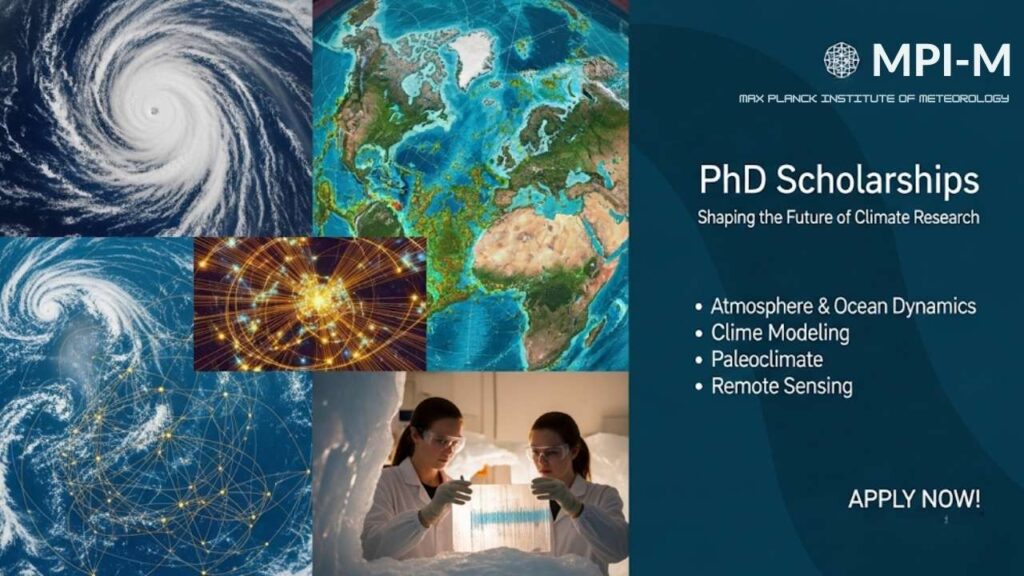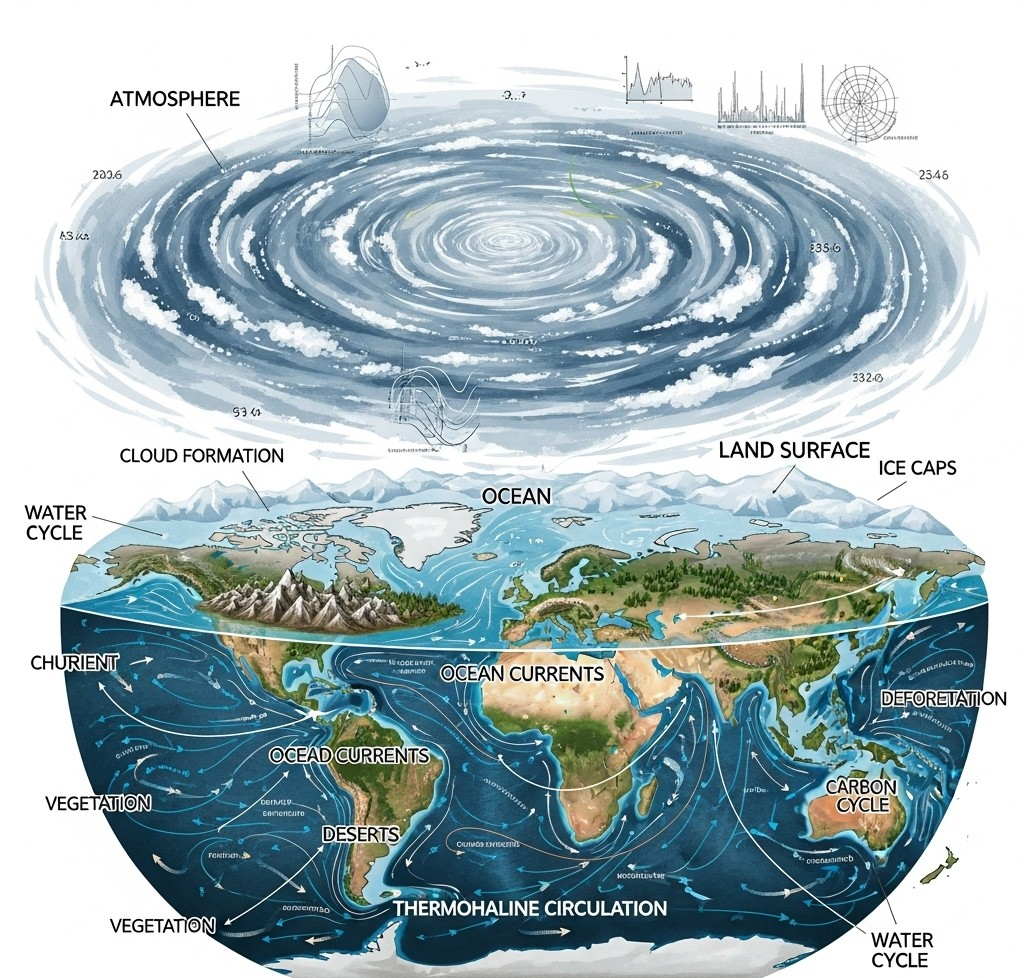Embarking on a Ph.D. is a monumental step, a journey of deep inquiry and personal growth. For those passionate about understanding our planet’s complex climate, the Max Planck Institute of Meteorology PhD scholarships represent a golden opportunity. This isn’t just a chance to get a Ph.D.; it’s an invitation to join a global community of top-tier researchers in a world-class institution. In this guide, we’ll break down exactly what these scholarships entail, what the application process looks like, and how you can position yourself for success. I’ve seen many successful applicants focus not just on their grades, but on demonstrating a genuine curiosity and a clear vision for their research. This article is your roadmap to doing the same.

Understanding the Opportunity: The IMPRS-ESM Program
The Max Planck Institute for Meteorology (MPI-M) offers its Ph.D. scholarships through the International Max Planck Research School on Earth System Modelling (IMPRS-ESM). This program is a structured, interdisciplinary training ground for the next generation of climate scientists. It’s a collaboration between the MPI-M and the University of Hamburg, meaning you’ll get the best of both worlds: the cutting-edge research environment of a Max Planck Institute and the academic rigor of a leading university.
The program’s core mission is to advance our understanding of Earth’s system processes and improve our ability to predict future changes. This is a critical field, and the IMPRS-ESM program is designed to equip you with the skills and knowledge to make a real impact. The program typically runs for three years, with a possible one-year extension, providing a secure and supportive environment for your doctoral work.
What Research Topics Await?
The scope of research at MPI-M is vast and exciting. Ph.D. candidates typically dive into projects that align with the institute’s core departments and research groups, which include:
- Climate Physics: Investigating everything from global circulation to cloud dynamics and their role in the climate.
- Climate Dynamics: Studying the intricate interactions between the atmosphere and the biosphere.
- Climate Variability: Exploring complex modeling, ocean biogeochemistry, and the prediction of climate and weather extremes.
You’ll find that projects often focus on using and developing sophisticated Earth System Models (ESMs) to simulate and understand climate behavior. According to the IMPRS-ESM research page, current and recent Ph.D. topics range from “the role of rain evaporation” to “ocean-atmosphere interactions and their links to weather patterns.” This is a place where you can genuinely contribute to a global conversation.

The Application Process: Your Step-by-Step Guide
The application for the Max Planck Institute of Meteorology PhD scholarships is highly competitive, so preparation is key. The annual call for applications for the 2026 intake is scheduled to run from July 1st to September 15th, 2025. Here’s a breakdown of what you need to know to successfully navigate the process.
Eligibility at a Glance
The program is open to candidates from all over the world who hold, or are about to receive, a Master’s degree in a relevant field. This includes, but isn’t limited to, physics, meteorology, geophysics, oceanography, mathematics, computer science, and engineering.6 While an excellent academic record is crucial, the program also looks for candidates with strong scientific potential, a curious mind, and a high level of proficiency in English. It’s important to note that you don’t need to have your Master’s degree in hand at the time of application, but you must have it before you can officially start the program.
Required Application Documents
To submit a complete application, you will need to prepare several key documents. This isn’t a quick checklist; each document is a chance to showcase your unique story and research potential.
- Online Application Form: This is your first point of contact. You’ll enter personal data, academic history, and your research interests. Be specific and clear about why you are applying to the IMPRS-ESM program and which research groups you are most interested in.
- Curriculum Vitae (CV): A comprehensive and up-to-date CV is essential. Highlight your educational background, research experience, publications, and any awards or honors you’ve received.
- Academic Transcripts and Certificates: You’ll need to upload official transcripts for all your degrees, including both Bachelor’s and Master’s. If you haven’t finished your Master’s, an updated transcript with your current grades is sufficient for the application stage.
- Letters of Reference: This is a crucial part of your application. You will be asked to provide contact details for at least two academic referees. The application portal will then send them an invitation to submit a confidential reference. Choose professors or supervisors who know you well and can speak to your research abilities and potential. I’ve found that a strong, personal recommendation can make a world of difference.
- Proof of English Proficiency: Since the working language of the program is English, you’ll need to demonstrate your skills. The institute recommends submitting scores from a TOEFL or IELTS test if available, especially if your previous degree wasn’t taught in English.

The Importance of Your Research Statement
While not a separate document for every program, your motivation statement is where you connect the dots for the admissions committee. This is where you explain why you are drawn to the IMPRS-ESM program, what specific research questions intrigue you, and how your past experience has prepared you to tackle a Ph.D. You should explicitly connect your skills and interests to the work being done at MPI-M. Show them you’ve done your homework and are ready to contribute from day one.
Life as a Ph.D. Student in Hamburg
If your application is successful, you’ll be heading to Hamburg, a vibrant city in northern Germany. As an IMPRS-ESM student, you’ll receive a full doctoral contract, which provides robust financial support.This isn’t just a stipend; it’s a competitive salary that includes health insurance and other social benefits. This financial security allows you to focus entirely on your research without the added stress of finding external funding.
The program also emphasizes professional development beyond your research. You’ll have access to a variety of workshops, seminars, and networking events designed to enhance your “soft skills” and prepare you for a successful career, whether in academia or industry. The collaborative atmosphere is one of the program’s most significant strengths. With a diverse international student body, you’ll work alongside peers from different backgrounds, gaining new perspectives and building a global network of colleagues.
Your Next Steps: Preparing for Success
Securing one of the Max Planck Institute of Meteorology PhD scholarships is a challenge, but it’s one that is well within your reach with the right preparation. Here are some actionable steps you can take right now to get ready for the application period:
- Review the Research: Go to the MPI-M and IMPRS-ESM websites and explore the research of the different departments and research groups. Identify a few professors whose work genuinely excites you.
- Polish Your CV: Make sure your CV is up-to-date and clearly highlights your academic achievements, research projects, and any relevant skills.
- Identify Referees: Think about who you will ask for reference letters. Contact them well in advance to give them plenty of time to write a thoughtful and detailed recommendation.
- Start Your Statement: Begin drafting your motivation letter. This is a chance to tell your story, and starting early will give you time to refine it into a compelling narrative.
The journey to a Ph.D. is demanding, but it’s also one of the most rewarding experiences you can have. The Max Planck Institute of Meteorology offers an exceptional environment to pursue your research ambitions. By preparing thoughtfully and demonstrating your passion, you can make a strong case for yourself and take a significant step toward a career at the forefront of climate science.
Your Ultimate Guide to the Rhodes Scholarship 2025 for the Commonwealth Caribbean
FAQs
1. Do I need a Master’s degree to apply?
Yes, a Master’s degree (or an equivalent qualification) is required to be considered for the program. You can apply even if you have not yet completed your Master’s, but you must have it finalized and the official certificate in hand before you can officially begin your Ph.D. studies at the Max Planck Institute of Meteorology.
2. Is the scholarship fully funded? What does the doctoral contract include?
Yes, the Max Planck Institute of Meteorology PhD scholarships are fully funded. Admitted students receive a full doctoral contract, which is a competitive salary. This includes all social benefits, such as public health insurance, retirement contributions, and unemployment insurance, allowing you to focus on your research without financial worries.
3. What is the application timeline for the March 2026 intake?
The main application period for the March 2026 intake is scheduled from July 1st to September 15th, 2025. This is a general annual timeline, but it’s crucial to always check the official IMPRS-ESM website for the exact dates for the specific intake you are applying for, as they may be subject to minor changes.
4. Do I need to speak German to apply?
No, the working language for the IMPRS-ESM program and all research activities at the institute is English. Therefore, you do not need to be fluent in German to apply or to complete your Ph.D. However, living in Hamburg and Germany will be a much richer experience if you learn some basic German for daily life.
5. Can I propose my own research project?
The IMPRS-ESM program typically offers a list of predefined Ph.D. projects each year that are supervised by faculty members. The application process involves you selecting the projects that best align with your interests and background. While you won’t propose an entirely new project from scratch, your application is your opportunity to demonstrate how your skills and ideas would contribute to one of the available projects.










